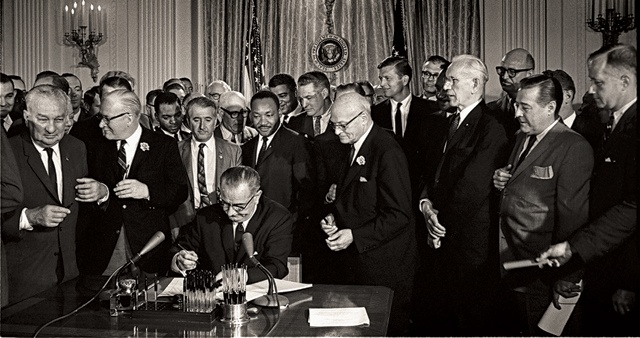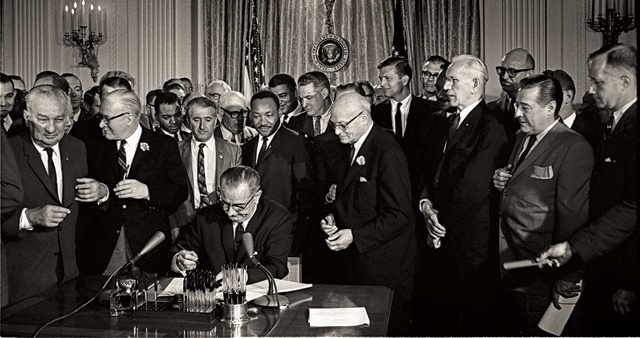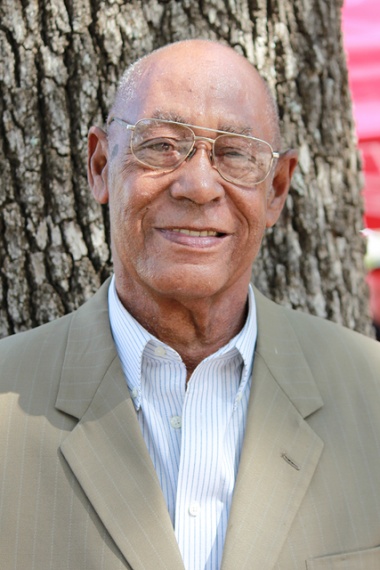This month marks the 50th anniversary of the Civil Rights Act, signed into law by President Lyndon B. Johnson. Lewis Young, 82, a Wood County Electric Cooperative director since 1981 and the board secretary/treasurer since 1998, shares his thoughts about what the Civil Rights Act meant to him. Young was born and raised in Van Zandt County and was a teacher in the Canton Independent School District for 36 years. The 1960s were turbulent years for the United States, to be sure, and the civil rights movement turned countless participants into public figures—some tragic and some heroic.
However, most Americans, black and white, were merely bystanders to history. We were students, workers, parents—just regular, everyday people living regular, everyday lives in a country simmering with social change.
I was a teacher with a young family in Van Zandt County in Northeast Texas, where I grew up, when President Johnson signed the Civil Rights Act on July 2, 1964. I was far removed from the front lines of the civil rights movement, and yet I knew precisely what the activists were fighting for and how adamant the opposition was in attempting to preserve the status quo.
As a teenager, I was rebuffed in my attempts to land a job. There weren’t any jobs out there for black kids, and you just accepted it.
When I joined the Army in the mid-1950s, I experienced the sting of segregation while traveling with a busload of draftees, headed to Fort Bliss in El Paso. As a black man, I stayed in a segregated hotel. We stopped to eat in Abilene. The white men ate in the dining room, with its fine white linens. I was sent to the kitchen, where I sat on a stool. We were all serving the same country, but I lived in a different world. That’s the way it was.
Later, as I was trying to start my teaching career, my first interview was set up with the county superintendent. I went to the district office, and when I walked in and explained why I was there, I was not offered a seat to wait. Then the superintendent came to the door and told me he had never hired a black person. That was the end of that. It was very degrading.
Three years later, that same district tried to hire me three years in a row.
I was instrumental in helping a rural water system get started in this area. Many times, as I tried to enlist customers, white people turned me away. They refused to drink water from lines that would serve black people.
These were the times we lived in: Blacks had their place in society, and whites tended to make sure we didn’t transgress the boundaries of our place.
That changed with the Civil Rights Act. This piece of legislation affirmed that I am as good as the next person—no better, but as good. It instilled in me a sense of pride.
When I was a child, I didn’t think about what it meant to be black or about racial differences. It wasn’t something my parents talked a lot about. They were concerned about education more than anything else. They were determined that their children would get an education. I’m one of seven children, and we all finished high school. That was a must.
Two of us became teachers. It seemed like most black people back then had two choices—preach or teach.
I worked in an integrated school system for 30 years. I didn’t see any difference in any child. I didn’t see color, even though I was the only black teacher. I can count on one hand the problems I had in the classroom. I had no sense that white students or their parents had a problem with me because of my race. I had one child tell me that I was the only person to make him feel like a person. That was after I let him help me pass out papers one day. He was white.
Today, when I meet former students, we talk about the times in my classroom and share funny and heartwarming stories— not about race, but about life and fond memories.
When I think of the Civil Rights Act, I think of LBJ, who also was so instrumental in bringing electricity to the countryside. Co-ops owe a debt of gratitude for the improvements he delivered to their members’ lives.
I also think about Martin Luther King Jr. and the work he did to bring about social change. He was a great man. I believe he was touched by God for this moment in history. He was one of the great leaders of that era whose life was cut short. John F. Kennedy was another. We lived through a lot of tragedies, and I guess those tragedies were for the betterment of mankind. I used to tell my students that great leaders don’t live long.
I also give Thurgood Marshall a lot of credit for the integration of this country. He fought his battles through the courts. Before President Johnson appointed him to the Supreme Court, Marshall won perhaps the most important legal case of the century in 1954, Brown v. Board of Education, ending the legal separation of black and white children in public schools.
I remember seeing Marshall in Tyler in October 1956. He was there fighting efforts by the state’s attorney general to shut down the NAACP and the Legal Defense Fund. Marshall had to stay in a private home because as a black man, he couldn’t stay in a hotel room.
I see the effects of the Civil Rights Act in my own family. I taught for many years and worked hard to save money. I was able to put my children through college, and when they graduated, they had no debt from student loans. They entered adulthood in a world that had changed since I got out of college. They didn’t have the limited choice of “teach or preach.”
My son, Reggie, is a business development manager in crop protection for DuPont. My daughter, Djuana, is the executive director of admissions at the University of Houston.
The Civil Rights Act meant opportunities for me and my children and my children’s children. It’s part of LBJ’s legacy. Even as the debate continues about whether the Civil Rights Act has brought about enough social change or has done it fast enough, I am confident it ensures that more Americans, through persistence and determination, will continue to achieve their dreams.
Lewis Young and Clotene, his wife of 56 years, live in the Prairie Creek community, where he grew up.
———————
Tom Widlowski, associate editor




